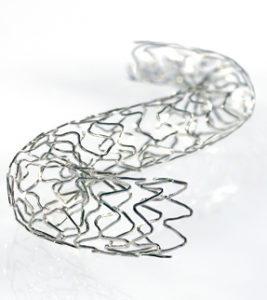
OrbusNeich launched its latest generation dual therapy stent, the Combo Plus. According to a press release, the Combo Plus has a unique anti-CD34 antibody biological coating that offers an advanced approach to active vessel healing combined with improved deliverability for patients with complex coronary artery disease. The press release reports that multiple design features make the stent a unique and effective option for treating coronary stenosis.
Following implantation, the biological coating on the outer surface of the Combo Plus is designed to immediately capture endothelial progenitor cells and initiate the formation of an endothelial layer. This accelerated healing process leads to earlier return of functionality and may reduce adverse events in the long-term. In concert with the biological layer, a directional coating of bioabsorbable polymer elutes sirolimus to inhibit neointimal hyperplasia.
Furthermore, Combo Plus employs an enhanced balloon catheter with a lower profile design, lubricious coating and reduced shaft diameters for superior deliverability. The stent design is based on OrbusNeich’s R-Stent pattern, which has proven to impart strength and stability during expansion without sacrificing conformability.
David Chien, chairman of the Board at OrbusNeich, comments: “Our design improvements provide superior deliverability and powerful performance for complex daily practice. Combo Plus offers physicians a compelling new treatment option for patients with coronary artery disease.”
In 2013, OrbusNeich launched the Combo dual therapy stent—the world’s first dual therapy stent to accelerate endothelial coverage and control neointimal proliferation through the combination of the proven pro-healing technology with an abluminal sirolimus drug elution delivered from a bioresorbable polymer that is completely dissipated within 90 days. The press release states that the device is supported by clinical evidence from the REMEDEE family of studies and several other investigator-initiated studies, totalling more than 6,000 patients enrolled across more than 26 countries.









